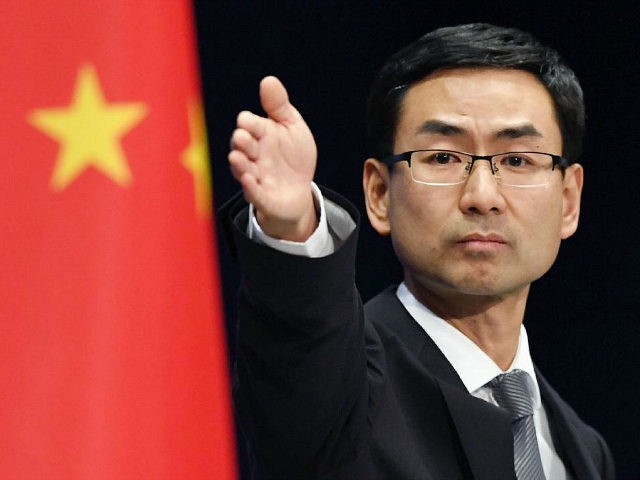The Chinese Foreign Ministry issued a warning to the United States to exercise “caution” in handling relations with Taiwan, whose sovereignty China does not recognize, following a report claiming Washington would soon send more troops to defend its presence in Taipei.
The South China Morning Post reported this week that up to 15 Marines may soon be stationed in Taipei to protect the American Institute in Taiwan (AIT), the diplomatic headquarters of the United States on the island. As Washington does not recognize Taiwan as a sovereign nation, instead adhering to Beijing’s “One China” policy, there is no formal American embassy in Taipei.
The source for this news is the AIT’s former director, William Stanton, who left the position in 2012. He told a Taiwanese radio station that he expected Washington to soon deploy ten to fifteen Marines to the facility. He refused to refer to it as a “troop” deployment but, rather, a “small guard force” and claimed the plan had been in motion under President Barack Obama. “It’s a tradition at all US diplomatic representatives’ offices around the world to have a detachment of marine guards to protect the facility. It is standard practice,” he insisted.
Chinese Foreign Ministry spokesman Geng Shuang responded to the news with a request to the United States to refrain from seeking to improve ties with the Taiwanese government. “The Chinese side opposes all forms of official contact and military interactions between the US and Taiwan,” Geng told reporters Friday. “We hope that the US will abide by the one-China policy and principles prescribed in the three joint communiqués between China and the US, and properly deal with Taiwan-related issues in a prudent manner.”
Beijing has repeatedly expressed concern in response to the positive relationship between Taiwan and the new administration of President Donald Trump, which has also appeared more open to a closer relationship with Trump than the past White House. The Chinese Communist Party reacted with particular concern to President Trump accepting a phone call from Taiwanese President Tsai Ing-wen. While Tsai only used the call to congratulate President Trump on his election victory, the one-on-one conversation broke decades of precedent regarding U.S.-Taiwan relations, alarming China.
The Chinese government responded with a series of air missions over Taiwan and repeated calls to President Trump to make an affirmative statement in defense of One China. The nation’s state-run publications published multiple editorials warning that China may “take the gloves off” with the United States should Trump attempt to expand relations with Taiwan.
Trump ultimately lowered the temperature on China’s belligerence regarding his Taiwan policy by reaching out directly to President Xi Jinping. President Trump sent Xi a letter wishing the Chinese people a happy Lunar New Year and Lantern Festival this month. Shortly following China expressing public gratitude over receiving the letter, Trump and Xi held their first phone conversation. The White House described the call as “extremely cordial” and said Trump had vowed to commit to One China during it.
Following this phone call, it appeared that Beijing had refocused its concern regarding Taiwan’s sovereignty towards India. A piece in the state-run propaganda outlet Global Times this week warned India that it was acting “as a provocateur” for accepting a visit from a parliamentary delegation from Taipei. “By challenging China over the Taiwan question, India is playing with fire,” the column argues. “To India, the island can not only help realize some of India’s development goals, but also, strategically, check the mainland.”

COMMENTS
Please let us know if you're having issues with commenting.